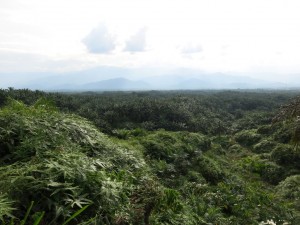
Chances are you’ve heard of Australia’s Great Barrier Reef, America’s Yellowstone and Africa’s Serengeti – iconic wild areas rightly famous the world over for their outstanding natural grandeur. But how about Indonesia’s Leuser Ecosystem?
No? Well then, please allow me to introduce you.
Remote, rugged and not easily entered beyond its edges, the Leuser contains one of earth’s most radiant displays of life. It is a vast, teeming landscape stretching across some six million acres of steamy peatland swamps and intact lowland and mountainous rainforests. The forests of the Leuser are some of earth’s most ancient, meaning evolution has had the opportunity to work its colorful, fractal magic over unbroken tropical millennia – and the resulting richness of plant and animal varieties is spectacular.
The Leuser is home to the densest population of orangutans remaining anywhere and it is the only place where orangutans, tigers, elephants, rhinos and sun bears roam the same forest together. It may also be where many of these endangered animals make their last stand for survival.
Almost entirely within Indonesia’s Aceh Province on the north tip of the island of Sumatra, the Leuser Ecosystem is by any measure a world-class hotspot of biodiversity. In fact it is among the most fertile places ever documented.
But the Leuser is under siege from palm oil plantations and other development coming from all sides.
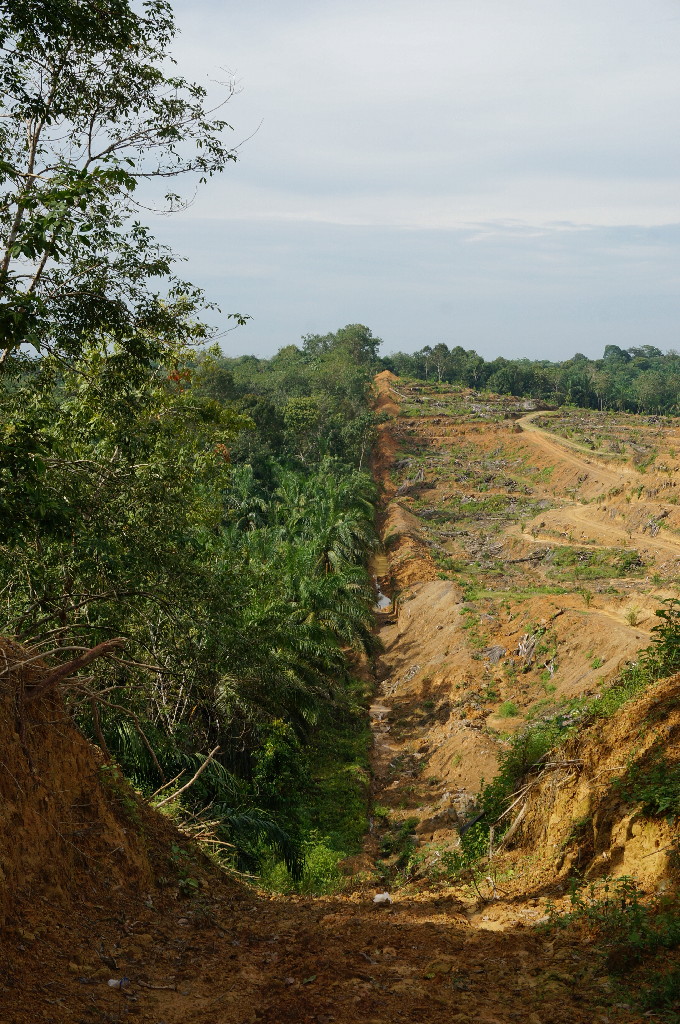
The Leuser Ecosystem contains three areas of carbon-rich peatlands known locally as the Tripa, Kluet and Singkil peat swamps. These tropical peat forests are the single most important type of ecosystem for the regulation of greenhouse gas emissions, but they are rapidly being drained, cleared and illegally burned for palm oil plantation expansion.
The scale and totality of devastation that has already been inflicted upon Sumatra’s once expansive rainforests is hard to overstate and even harder to fully comprehend. The only way to really begin to appreciate the immensity of what’s been lost is to see it from the air, industrial palm oil plantations sprawling so far in places that they curve out of view with the earth.
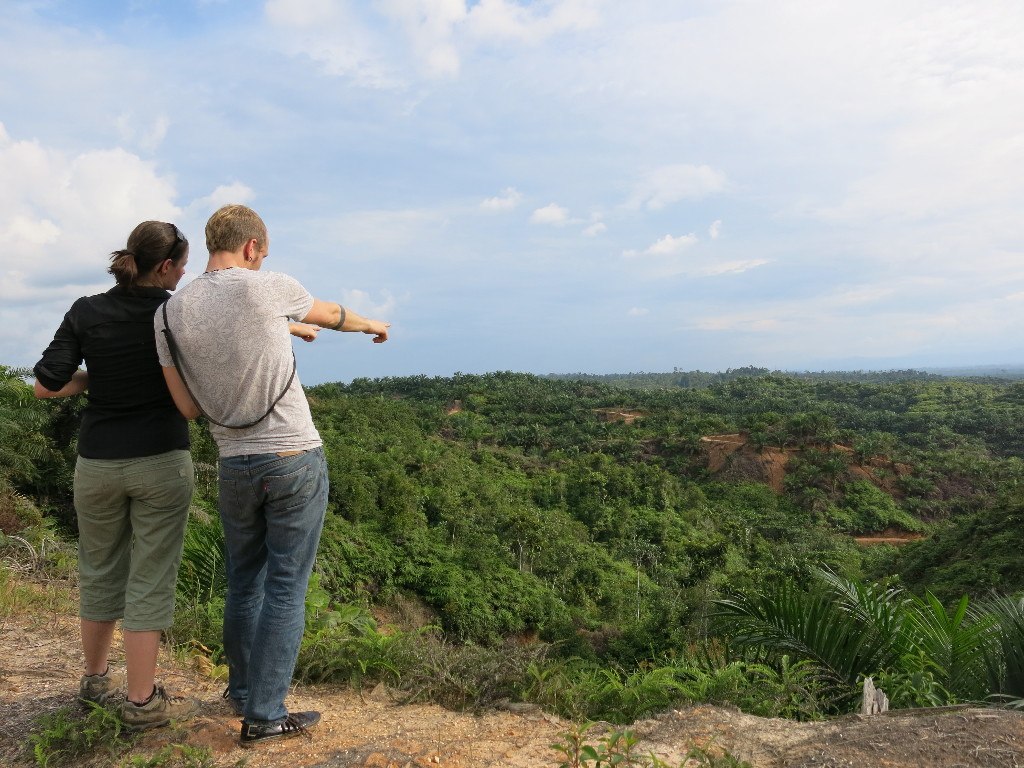
Over the past three days, I’ve had the amazing opportunity to skirt the edges of the Leuser and catch fleeting glimpses of what’s inside. We found elephant poop on the trail, heard Siamangs (an acrobatic ape with inflatable throat sacs) calling overhead and spotted an orangutan nest high in a tree. Each of these hopeful signs of life were found just steps outside the geometric rows of oil palm pressing incessantly forward. To reach the fraying edges of the ecosystem required a sobering journey of hours upon hours of treacherous driving through a labyrinthine maze of muddy plantation roads.
Standing even at a distance from the primary forest here you can hear the cacophonous sounds of life emanating from within – gibbons bellowing, birds singing and bugs of all kind buzzing. Inside the scorched earth of the plantations, however, is an unsettling silence. Hours can pass without even seeing a bird. The chemical laden plantations are a total biological wasteland. This destruction is the face of Conflict Palm Oil. Real people’s livelihoods are being stolen from them and whole species are threatened with annihilation forever.
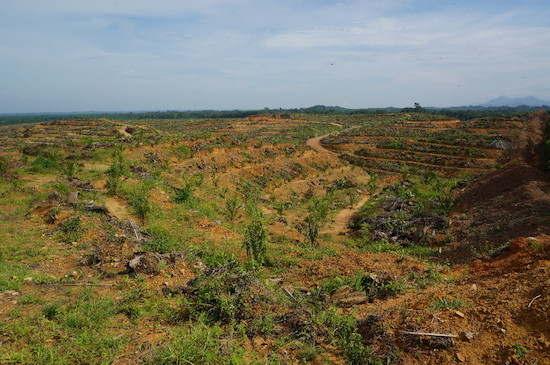
Political instability in Aceh shielded much of the region’s forests from the devastation inflicted on the rest of Sumatra in past decades, but the new government of Aceh is right now considering a plan that would remove protections from large regions of forest within the Leuser Ecosystem.
If there were ever an absolute no-go zone of highest-level international conservation priority, the Leuser Ecosystem is it. Palm oil from the Leuser is already entering the global marketplace with no way to track where it ends up. No further destruction of this world-class area for palm oil, mining or other commodity production should be considered acceptable.
All is not lost though. An enormous block of intact, primary forest remains. But it is the last. There is no more fucking this up and getting second chances to preserve a place of this size and caliber.
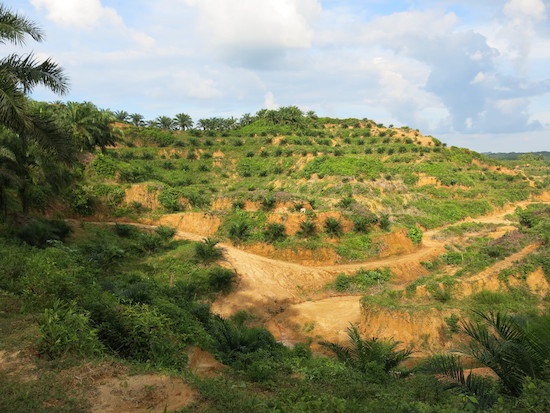
Rainforest Action Network’s campaign, Last Stand of the Orangutan: The Power is in Your Palm, is designed to leverage our collective customer power to convince some of the worlds most powerful food companies, The Snack Food 20, to make firm demands of their suppliers that they will only purchase truly responsible palm oil that can be traced back to its source to verify it was not grown in places like the Leuser.
The companies who buy palm oil produced at the expense of the Leuser Ecosystem need to hear that you are paying attention and that you demand an end to Conflict Palm Oil in your food. A number of these companies have explicitly told us that they know they have a palm oil problem but that they are not yet hearing a strong enough outcry from their customers to make the needed change. We have to change that, and quick.
The politics of Indonesia and the intricacies of international commodity supply chains are fiendish and complex, but they are not insurmountable. If you have not yet taken action to stand with the last wild orangutans by sending an #InYourPalm photo petition to the Snack Food 20 companies – please do it now. If you have not signed up for RAN’s Palm Oil Action Team, you can do that here.
Then stay tuned and we will alert you to the key, strategic moments to fight for the Leuser and the next phases of this ambitious effort to eliminate Conflict Palm Oil for good.